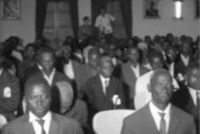 In Portugal, on one hand, leftists can use decolonization as that apologetic pat on the back, in an orgiastic self-flagellation of White guilt, always reiterating how Whites are horrible and privileged bastards who only know how to hurt the rest of the world. Apparently, this absurd and self-centered mea culpa makes the world fairer and abracadabrally fades away all issues of oppression. On the other hand, even right-wingers can use it to further fuel their unfounded hatred and their glimpses of grandeur, based on a romanticized past of conquest and domination as a show of intellectual and racial superiority.
In Portugal, on one hand, leftists can use decolonization as that apologetic pat on the back, in an orgiastic self-flagellation of White guilt, always reiterating how Whites are horrible and privileged bastards who only know how to hurt the rest of the world. Apparently, this absurd and self-centered mea culpa makes the world fairer and abracadabrally fades away all issues of oppression. On the other hand, even right-wingers can use it to further fuel their unfounded hatred and their glimpses of grandeur, based on a romanticized past of conquest and domination as a show of intellectual and racial superiority.
Mukanda
10.03.2025 | by Marinho de Pina